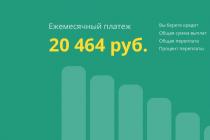The Central Bank of the Russian Federation (abbreviated as the Central Bank, or the Bank of Russia, or the Central Bank) is the main bank of the country, which is responsible for the security and stability of the ruble against other currencies of the world, the development and strengthening of the banking system, supervision of the activities of other banks, issuance and recall licenses.
The Central Bank is the only bank in the country that is engaged in the issue of money, that is, the production and issuance of cash (minting coins and printing banknotes), as well as replacing old banknotes with new ones.
The Central Bank of the Russian Federation is not a bank familiar to all of us, the same as, for example, Sberbank or Alfa-Bank. He is one of a kind and stands above all banks. Schematically it looks like this:
A person from the street cannot come to the Central Bank for a consumer loan, he does not work with individuals, but works with commercial banks, namely, he exercises control and supervision so that bankers conduct their activities honestly. The Central Bank does not interfere in the activities of the banks themselves, but it can deprive the license or, conversely, it can help the bank if it has temporary difficulties, for example, give a loan or take a bank for.
History of the Central Bank of the Russian Federation
To understand what kind of organization - the Central Bank, it is worth turning to history. In the USSR, the main financial institution was the State Bank. After the collapse of the Union, the functions of the State Bank were transferred to the Central Bank of the Russian Federation, except that the main bank of the country ceased to be a state institution. It has become an independent legal entity. The State Bank in the USSR, one might say, was subordinate to the Council of Ministers. After all, it was he who appointed and removed the leaders. And most importantly, the Council of Ministers calculated how much money the state needed. That is, the state through its bank itself decided how much money was needed, and the bank already printed them in the required amount.
Today's main banking institution of the country is not subordinate, but rather interacts with the same state. For the Central Bank reports on its activities to the State Duma. In state ownership - the authorized capital, all other assets of the Central Bank. On its activities, the Central Bank annually sends reports to the State Duma - on losses, incomes. In addition, these reports must be published in the media. And the Central Bank is required by law to give part of its profits to the budget. So, the complete independence of the Central Bank from the state, especially with regard to its activities in order to earn profit, still has to be said conditionally.

Where is the Bank of Russia registered and who owns
The Central Bank is a legal entity registered in Moscow, where the central authorities responsible for the management and proper functioning of the main bank of the country are located.
The authorized capital of the Central Bank of the Russian Federation is 3 billion rubles. The authorized capital, like other property of the bank, is federal property. The legal status implies that the bank itself ensures its work. He transfers 75% of his income to the federal budget.
It turns out that just as any individual can organize an LLC or OJSC and engage in commercial activities, so the government has created a legal entity that is engaged in certain activities, it cannot be said that it is commercial, since this is not entirely correct. All the same, the main task of the Central Bank is to protect and ensure the stability of the ruble, as well as control over banking activities in the country, its proper functioning. The income received is a side effect from this activity, which is transferred to the main owner, that is, the state.
But at the same time, according to the papers, this is not a state body. This means that the Central Bank is not responsible for the activities of the state. If the state, and on the balance sheet of the Central Bank there are significant gold and foreign exchange reserves or currency reserves, this does not mean that the Central Bank must repay the debt of the state with these funds. Also, the state is not responsible for the obligations of the Central Bank.
Functions of the Central Bank of Russia
But the main banking institution of the state still commands the money in the country, with the only difference being that the Central Bank cannot print as much money as the country needs. This fact is explained by the fact that the Central Bank is subject to the rules of the International Monetary Fund, of which Russia became a member in 1992.
This was done in order to access foreign currency loans and was caused by the economic, financial and systemic crisis in the country. At that time, Russia needed financial assistance more than ever. Russia began to receive currency loans to stabilize the economy, interventions to reduce the dollar exchange rate, but at the same time, the Central Bank lost the right to independently lend to the country's economy, but can participate in lending to other countries. These are the rules of the IMF, whose members are required to comply with them.
The first loan was opened in August 1992 in the amount of about a billion dollars, the purpose of which was to maintain the state budget deficit and inflation. Failure to comply with the rules of the IMF means the exclusion of Russia from its members, and hence the automatic denial of access to IMF credit funds. And no one can give guarantees that they will no longer be needed.
So the Central Bank plays according to the rules of the IMF and can print only as many rubles as they could earn dollars by selling oil, gas and other things that are quoted on the foreign market for them. Alas, we are now firmly tied to the dollar.
So one of the tasks of the Central Bank is the issue (more simply, the issue) of cash, and in connection with this, the organization of the circulation of cash in the country.
Performs the Central Bank and other functions. All of them are named in the relevant documents regulating the activities of the main bank of the state. These documents can be viewed at the links below:
In accordance with legislative acts, these goals are as follows:
- in protecting the national currency of Russia from exchange rate fluctuations, which, unfortunately, the Central Bank does not always successfully cope with. Although there are certain explanations for this. First of all - the fall in oil prices - the main product for which Russia rescues dollars on the world market.
This is due to the fact that the countries of the Arab world do not reduce the amount of oil produced, and the fact that the production of shale oil in the United States has actively gone. Anti-Russian sanctions played a significant role in the growth of the dollar. Large businesses, whose products were subsequently successfully sold, including for dollars, are denied long-term loans by European banks due to sanctions.
Another reason follows from the previous one. Demand for the currency pushed up its price. Provoke the growth of the dollar and other reasons - speculative transactions (buy cheaper - sell more expensive), in itself, the growth of the world dollar;
- development and then implementation of the credit policy of the Russian Federation, the main postulates of which are the reduction of inflation, the availability of bank loans to enterprises in the real sector of the economy, the stabilization of banking structures, increasing their competitiveness at the international level, their ability to provide long-term loans to enterprises of the Russian economy. After all, as you know, large projects are implemented mainly only on credit money;
- establishing the rules according to which banking operations are carried out;
- development of measures, and then their implementation for the development of the entire banking system, its modernization;
- ensuring measures for the functioning of payment mechanisms.
And the above are just some of the tasks that the main banking institution of the country solves. There are many others. For example:
- The Central Bank issues permission to register a particular non-state pension fund, assessing its capabilities;
- pays debts to clients of bankrupt banks, if this or that bank was not in the system of compulsory deposit insurance;
- establishes industry standards for accounting charts of accounts.
There are more that we will dwell on in more detail, because it is these tasks performed by the Central Bank that excite the average citizen of the country most of all, since it happens that the decision of the Central Bank concerns a person personally.

Issues and revokes licenses
For example, the fact that the Central Bank:
- issues licenses to banking and other credit organizations;
- prohibits banks from operating, which is expressed in the revocation of licenses.
Since the appointment of Elvira Nabiullina as head of the Central Bank, more than 100 banking institutions have lost their licenses for the right to conduct banking activities. This is caused precisely by the task of stabilizing banking structures.
Many of those banks whose license was revoked by the Central Bank carried out dubious operations, implemented risky principles of credit policy, for example, by issuing unlimited loans. Bank depositors, including individuals, suffer from such an excessive love for issuing loans. And definitely - organizations that had a bank account and which carried out all their financial transactions through it.
An example of dubious operations of banking structures
The grounds on which a bank's license may be revoked are stipulated by law. These may be situations where:
- credit capital is 2% less than required;
- the bank's own funds are below the authorized capital;
- the bank cannot independently within 2 weeks pay off all creditors, the same Central Bank from which a commercial bank borrows money;
- the bank arbitrarily reduces the authorized capital, which becomes lower than the amount of funds at its disposal.
There are also less serious violations, allowing the bank to lose its license.
Determines the refinancing rate
There is another issue that the Central Bank decides and which worries to a large extent those ordinary people who use credit products from commercial banking structures - this is.
There is also another term - the key rate. Expressed as a percentage. It is under these percentages that commercial banks borrow money from the Central Bank. And already at their interest rate, respectively, higher than the one at which they received, they lend to organizations, entrepreneurs, and ordinary residents.
It turns out - the higher the refinancing rate - the more interest that will have to be paid in commercial banks by those who lend. And in Sberbank too - even despite the fact that many people far from the financial sector still consider it to be state-owned. This is wrong. Yes, even if it were so, do not forget that the Central Bank is not a state structure, the institution does not depend on the state in any way, and the Central Bank also lends to this very state, so to speak, although it is a shareholder of Sberbank. More than 50 percent of the shares of Sberbank belong to the Central Bank.
What determines the refinancing rate? Mainly on the level of inflation in the country, that is, the availability of money in the population, according to its purchasing power. By raising or lowering the refinancing rate, the Central Bank regulates the rate of inflation in an attempt to keep it in check.
At a low rate, purchasing power increases, as a result, prices begin to rise. They buy a lot - it means that manufacturers produce more products and raise prices. They have the opportunity to produce more products - after all, they manage to get money in a commercial bank at a lower, more favorable percentage.
The population also has more funds in their hands, including thanks to affordable credit money. Lowering the refinancing rate to a certain point stimulates the economy. Why up to a certain point? Yes, because the reduction of the key rate begins to contribute to the growth of inflation - the process when money depreciates.
And the Central Bank raises the rate. Loans are becoming more expensive, it is no longer profitable for individuals and legal entities to take them. Over time, the amount of cash in the hands of the ordinary population decreases, consumer demand gradually decreases, manufacturers produce fewer products, and price growth slows down. And that means higher inflation.

Determines the exchange rate
There is another function that the Central Bank performs and the result of which, to a large extent, worries those Russians who have to exchange rubles for foreign currency - this is the determination of the exchange rate.
The Central Bank does not take the dollar from the ceiling. This rate is determined taking into account the data of currency trading on the interbank foreign exchange market. Today there were auctions, tomorrow this course in Russia. So the exchange rate of the dollar and other currencies is floating today. And a return to a strictly established, clearly undervalued exchange rate, which some ordinary people sometimes advocate, will lead to the situation that was in the USSR.
Then the officially established price of the dollar, especially in the last years of the existence of the Union, did not exceed one ruble. Only now it was impossible to buy dollars at such a price. They were not freely available. The speculators sold the dollar and up to 4 rubles for one green. And transactions with currency were criminally punishable.
An increase in the dollar exchange rate, as a rule, affects the growth of prices in the domestic market, including consumer goods. After all, the equipment on which these goods are produced, the ingredients are in most cases imported and purchased for foreign currency.
Management structure of the Central Bank
The fulfillment of the functions and tasks assigned to the Central Bank would not have been possible without a clear structural organization of the Central Bank, coordination of its activities with the interests of the subjects of state regulation of the economy at all levels - from interaction with the government of the country to the governments of the regions.
To solve problems in the regions, the Central Bank has representative offices in all subjects. Accordingly, the divisions of the Central Bank located in the constituent entities of the Russian Federation are subordinate to the central office.
The main body is the National Financial Council. It consists of 12 members, that is, it is a collegial body. It consists of representatives from the Federation Council (two people from the Federation Council), the State Duma (three people from deputies), the Government of the Russian Federation (three people). Appointed to the Council of the person and the President of the Russian Federation - also three. The chairman of the Central Bank is a member of the NSF.
The highest executive structure of the Central Bank is the board of directors. It determines the vector of activity of the Central Bank, sets goals, guidelines for work. In addition to the chairman, the board of directors has 14 more members. They work on a permanent basis. The Board of Directors is also formed under the watchful eye of the State Duma and the President. The Board of Directors meets once a month. And it is he who solves the questions:
- regarding the issue of the ruble;
- establishes standards for commercial banks;
- market transaction limits;
- interest rates;
- current credit limits;
- forms a list of securities, which also includes bills used to secure loans from the Central Bank.
The Board of Directors performs supervisory, control functions, that is, it supervises and manages subordinate structures.

Board of Directors of the Central Bank of the Russian Federation
- central office of the Central Bank;
- territorial divisions;
- RCC - stands for cash settlement centers;
- military divisions of the Central Bank.
The main task of all the listed structures of the Central Bank is the implementation of certain measures for the implementation at the federal level of the financial policy adopted by the bank.
Who is the chairman
Since 2013, the Chairman of the Bank of Russia since 2013 is Elvira Sakhipzadovna Nabiullina. She is the first woman to hold such an important position in the Central Bank of all the G8 countries. According to the law, he appoints the head of the State Duma bank on the proposal of the president.

The term of appointment is 5 years. A person cannot be appointed to the post of Chairman of the Central Bank more than three times in a row.
In some cases, the removal of the chairman of the Central Bank from office is allowed. This may be in situations where:
- the term for which the chairman was appointed has expired;
- health condition does not allow to fully perform official duties. Confirmation of the state of health must be documentary - certificates with the conclusion of a commission of doctors;
- at his own request, the chairman submits a letter of resignation;
- for the proven commission of a criminal offense, the court issued an indictment against the chairman;
- the head of the Central Bank violates the legislation governing the activities of the bank;
- when it is revealed that the chairman or even members of his family keep money in banks of other countries, when their expenditure clearly does not correspond to the officially declared income, that is, corruption takes place.
And here is how the leaders of the Central Bank have changed since its foundation:
- Matyukhin G.G. - from 1990–1992
- Gerashchenko V.V. - from 1992–1994; 1998–2002
- Paramonova T.V. - from 1994–1995
- Khandruev A.A. - from 8 to 22 November 1995
- Dubinin S.K. - from 1995–1998
- Gerashchenko V.V. - from 1998–2002
- Ignatiev S.M. - since 2002–2013
- Nabiullina E.S. - from 2013 to the present.
Conclusion
So, now you know what the Central Bank of the Russian Federation is, why it is needed and what functions it performs. We hope this article has broadened your financial horizons.
Video for dessert: Biking in the mountains with a paraglider on your back
The accountability of the Bank of Russia to the State Duma means that the appointment and dismissal of its Chairman are carried out by the State Duma on the proposal of the President of the Russian Federation. Besides. The State Duma appoints and dismisses members of the Board of Directors of the Bank of Russia. The Bank of Russia submits its annual report and audit report to the State Duma for consideration. The State Duma determines an audit firm to conduct an audit of the Bank of Russia. In addition, she holds parliamentary hearings on the activities of the Bank of Russia and hears reports from its Chairman.
The Bank of Russia is independent within the scope of its powers, therefore, federal state authorities, state authorities of the constituent entities of the Russian Federation and local governments do not have the right to interfere in its activities. Otherwise, the Bank of Russia informs the State Duma and the President of the Russian Federation about this.
The Bank of Russia has the right to apply to the courts with claims to invalidate legal acts of federal state authorities, state authorities of the constituent entities of the Russian Federation and local governments.
The Bank of Russia has a dual legal nature: on the one hand, it is a public administration body with special competence, managing the monetary system, and on the other hand, it is a legal entity and can make civil law transactions with Russian and foreign credit organizations, with the state represented by Government of the Russian Federation.
The powers of the Central Bank aimed at entrepreneurial activity are established by Art. 45-47 of the Law "On the Central Bank of the RSFSR", according to which it has the right to provide loans for a period not exceeding one year secured by securities and other assets, buy and sell checks and bills of exchange, as well as government securities and bonds on conditions specified by law, to issue guarantees and sureties, to carry out other commercial transactions provided for by law.
In accordance with the Budget Code of the Russian Federation, the Bank of Russia maintains budget accounts and performs the functions of a general agent for government securities of the Russian Federation (Article 155, clause 2.3).
The objectives of the activities of the Bank of Russia as a governing body of the monetary system are:
- protecting and ensuring the stability of the ruble, including its purchasing power in relation to foreign currencies;
- development and strengthening of the banking system of the Russian Federation;
- ensuring efficient and uninterrupted functioning of the settlement system.
In accordance with the goals set for the Central Bank of the Russian Federation, its main tasks are as follows:
- active participation in the development of the monetary and financial policy of the Government of the Russian Federation;
- all-round containment of inflationary processes in the country;
- reducing the budget deficit;
- maintaining a stable monetary circulation;
- ensuring the stability of the ruble exchange rate as a state currency;
- provision of the state fund of foreign exchange reserves;
- expansion of lending to commercial banks, mainly due to the resources of the emission fund;
- expansion of opportunities for non-equity lending and covering the budget deficit at different levels of the government system;
- maximum use of methods of monetary management of the banking system.
Based on the goals and objectives set, the Bank of Russia performs the following functions:
- in cooperation with the Government of the Russian Federation develops and implements a unified state monetary policy aimed at protecting and ensuring the stability of the ruble;
- monopoly issues cash and organizes its circulation;
- is a lender of last resort for credit institutions, organizes a refinancing system;
- establishes the rules for making settlements in the Russian Federation;
- establishes the rules for conducting banking operations, accounting and reporting for the banking system;
- carries out state registration of credit organizations; issues and revokes licenses of credit organizations and organizations involved in their audit;
- supervises the activities of credit institutions;
- registers the issue of securities by credit institutions in accordance with federal laws;
- carries out currency regulation, including operations for the purchase and sale of foreign currency;
- determines the procedure for settlements with foreign states;
- organizes and implements currency control both directly and through authorized banks;
- participates in the development of the forecast of the balance of payments of the Russian Federation and the organization of the compilation of the balance of payments of Russia.
The Bank of Russia performs the function of the "bank of banks" and is the body of banking regulation and supervision of the activities of credit institutions. It exercises constant supervision over the observance by credit institutions of banking legislation and regulations established by it.
The main goal of banking regulation and supervision is to maintain the stability of the banking system, to protect the interests of depositors and creditors. The Bank of Russia does not interfere in the day-to-day activities of credit institutions, with the exception of cases provided for by federal laws. Supervisory and regulatory functions of the Bank of Russia are carried out both directly and through the banking supervision body created under it. The Central Bank of the Russian Federation regulates the activities of credit institutions and supervises them in the following areas:
- regulation of mandatory economic standards for credit institutions; determination of the limits of the open currency position, the procedure for the formation of reserves to cover risks;
- opening correspondent accounts, depositing required reserves of credit institutions on special accounts, accepting their free funds as a deposit at a fixed rate;
- lending to credit institutions;
- managing the liquidity of the banking system by buying and selling government securities to banks; in 1996, the Bank of Russia introduced a new instrument for regulating banking liquidity - repo-type operations;
- registration of issues of securities of credit institutions;
- establishing the rules for conducting certain banking operations, maintaining accounting records, compiling accounting and statistical reporting of credit institutions;
- registration and licensing of credit institutions;
- supervision over compliance with banking legislation, regulations of the Bank of Russia, verification of the activities of credit institutions.
Thus, for credit institutions, the Bank of Russia establishes the rules for conducting banking operations, maintaining accounting records, compiling and submitting accounting and statistical reports. In order to ensure the stability of credit institutions, the Bank of Russia establishes mandatory economic standards for them: the minimum amount of authorized capital, the minimum amount of required reserves placed with the Bank of Russia, etc.
These powers of the Bank of Russia manifest its coordinating and control functions over the activities of credit institutions. On the ground, these powers are exercised through the main departments (national banks) of the Bank of Russia, which are its branches.
If a credit institution violates federal laws, regulations and instructions of the Bank of Russia, fails to provide information or provides incomplete or inaccurate information, the Bank of Russia has the right to demand that the credit institution eliminate the identified violations, as well as to collect a fine or restrict certain operations by it or revoke its license.
Interacting with credit institutions, their associations and unions. The Bank of Russia advises them on the most important regulatory issues. In addition, he considers proposals on the regulation of banking activities.
One of the tools of the monetary policy of the Central Bank of the Russian Federation is credit auctions, which are held by the Central Bank of the Russian Federation on the basis of decisions of the Auction Committee of the Central Bank of the Russian Federation with the participation of the main territorial departments (national banks) of the Central Bank of the Russian Federation in the form of auctions of applications from commercial banks. The currency of the auctions is the ruble of the Russian Federation. The Central Bank of the Russian Federation announces the date of the auction no later than 7 calendar days in advance.
Participating in the auction: on the one hand - the Bank of Russia (seller), on the other - commercial banks and credit institutions of the Russian Federation (buyers). Branches of commercial banks cannot be participants in auctions.
Commercial banks that have a license to carry out banking activities in the territory of the Russian Federation, are included in the registration book of the Bank of Russia and have worked for at least a year by the time of filing an application for participation in the auction are allowed to participate in the auction.
Settlement and cash center of the Bank of Russia
The head cash settlement center (GRCC), the interdistrict cash settlement center, and the district cash settlement center (hereinafter referred to as the RCC) are a structural subdivision of the Bank of Russia operating as part of a territorial branch of the Bank of Russia. Establishment of the RCC, its reorganization and liquidation are carried out by the decision of the Board of Directors of the Bank of Russia in the manner established by the Federal Law "On the Central Bank of the Russian Federation (Bank of Russia)", Standard Regulations "On the Settlement and Cash Center of the Bank of Russia", adopted on October 7, 1996 No. 336, and other regulatory acts of the Bank of Russia.
The main purpose of the RCC as a structural unit of the Bank of Russia, carrying out banking operations with funds in a two-tier banking system, is to ensure the efficient, reliable and secure functioning of the payment system of the Russian Federation.
The RCC carries out its activities on the basis of federal laws, the said Regulations and other regulatory acts of the Bank of Russia.
RCC's relationships with serviced credit institutions, representative and executive bodies of state power, local self-government, federal treasury bodies, and other clients are built on a contractual basis.
The RCC performs the following functions:
- makes settlements between credit institutions (branches);
- provides cash services to credit institutions (branches);
- stores cash and other valuables, performs operations with them and ensures their safety;
- ensures accounting and control of settlement transactions and reconciliation of mutual settlements through correspondent accounts (sub-accounts) opened for credit institutions (branches);
- ensures accounting and control of cash transactions through correspondent accounts (sub-accounts) opened for credit institutions (branches);
- provides settlement and cash services to representative and executive bodies of state power, local governments, their institutions and organizations, maintaining accounts of budgets of all levels and bodies of the Federal Treasury of the Ministry of Finance of the Russian Federation, state non-budgetary funds, military units, military personnel, employees of the Bank of Russia, as well as others persons in cases stipulated by federal laws;
- provides services to clients that are not credit institutions in regions where there are no credit institutions;
- ensures the protection of valuables, banking documents and banking information from unauthorized access;
- develops and submits to the territorial branch of the Bank of Russia a forecast on the issuance result for the coming quarter as a whole for the serviced territory;
- establishes maximum cash stops at the operating cash desks of credit institutions (branches), other legal entities and exercises operational control over their observance in accordance with the current procedure;
- exercises control over the reliability of reporting on cash turnover compiled by credit institutions;
- draws up, based on the data of credit institutions, a calendar of issuance of money for wages and submits it to the territorial office of the Bank of Russia;
- checks the work of credit institutions to comply with the procedure for conducting cash transactions for the clientele served;
- regulates the required reserves deposited with the Bank of Russia, monitors the timeliness and completeness of the transfer of required reserves, and verifies the accuracy of the calculations of required reserves;
- participates in the implementation of the functional tasks of the territorial branch of the Bank of Russia:
- in the manner of transferring the right to provide banks with loans from the Bank of Russia in the prescribed manner;
- on his orders, participates in inspections of credit institutions (branches), applies sanctions to credit institutions served in the form of a fine in accordance with Art. 75 of the Federal Law "On the Central Bank of the Russian Federation (Bank of Russia)", etc.
In addition, the RCC additionally carries out transit and control operations for settlements with credit institutions located on the territory of the states that are members of the CIS, the Baltic countries and Georgia; transit and control organizations for inter-regional and intra-regional electronic payments, provides centralized forwarding of postal cash documents at the intra-regional and inter-regional levels in cooperation with specialized delivery services; carries out cash settlements based on the results of operations on the organized securities market and other operations with securities.
The RCC also provides accounting for transactions on the issue and sale of bonds, the payment of coupons on bonds of the State Republican internal loans, as well as other securities transactions determined by the CBR.
In accordance with the functional tasks assigned to it, the RCC performs the following main operations:
- opening, reissuing and closing correspondent accounts (sub-accounts) for credit institutions (branches) at their location, as well as other accounts for legal entities and individuals;
- writing off (crediting) funds from accounts (to accounts) of credit institutions (branches), other legal entities and individuals;
- control over compliance with the rules and deadlines for settlement transactions by credit institutions, other legal entities and individuals;
- control of making payments within the funds available on the accounts of credit institutions (branches), other legal entities and individuals;
- accounting for write-offs (credits) of funds by reflecting on correspondent accounts (sub-accounts), settlement and current accounts, accounts of MFOs, as well as other accounts opened on the balance sheet of the RCC (COU);
- reconciliation of the reflection of settlement transactions on correspondent accounts (sub-accounts) and other accounts opened on the balance sheet of the RCC (COU);
- protection of settlement documents with the use of special means;
- acceptance and issuance of valuables from reserve funds;
- accounting of emission transactions;
- accepting and issuing cash to credit institutions (branches) and other legal entities and individuals;
- cash handling;
- opening and closing loan accounts for the refinancing of banks by the Bank of Russia on the basis of loan agreements concluded by the territorial branch of the Bank of Russia;
- calculation of interest on credit operations, control over their timely and complete transfer.
Eriashvili N.D. Financial right. 2000
The Central Bank is the bank that leads the country's credit system, has the monopoly right to issue banknotes and implements monetary policy in the interests of the national economy.
The activities of the Central Bank of the Russian Federation are determined by the Constitution of the Russian Federation, the Federal Law "On the Central Bank of the Russian Federation (Bank of Russia)" and other federal laws.
The constitutional foundations of banking law perform the following defining functions:
1) program banking activities, extending the legal regime of entrepreneurship to it and establishing the freedom of movement of capital and financial services;
2) establish the minimum guarantees of the rights and interests of participants in banking legal relations, which cannot be limited by special banking rules (for example, the right to property, the right to information, the right to protection, etc.);
3) create a basis for uniform banking legal regulation, establishing that the legal foundations of the single market, financial, currency, credit regulation and money emission are within the competence of the Russian Federation.
The accountability of the Bank of Russia to the State Duma means that the appointment and dismissal of its Chairman are carried out by the State Duma on the proposal of the President of the Russian Federation. Besides. The State Duma appoints and dismisses members of the Board of Directors of the Bank of Russia. The Bank of Russia submits its annual report and audit report to the State Duma for consideration. The State Duma determines an audit firm to conduct an audit of the Bank of Russia. In addition, she holds parliamentary hearings on the activities of the Bank of Russia and hears reports from its Chairman.
The Bank of Russia is independent within the scope of its powers, therefore, federal government authorities, government authorities of the constituent entities of the Russian Federation and local governments do not have the right to interfere in its activities. Otherwise, the Bank of Russia informs the State Duma and the President of the Russian Federation about this.
The Bank of Russia has the right to apply to the courts with claims to invalidate legal acts of federal state authorities, state authorities of the constituent entities of the Russian Federation and local governments.
The Bank of Russia has a dual legal nature: on the one hand, it is a public administration body with special competence, managing the monetary system, and on the other hand, it is a legal entity and can make civil law transactions with Russian and foreign credit organizations, with the state represented by Government of the Russian Federation.
The powers of the Central Bank aimed at entrepreneurial activity are established by Art. 45-47 of the Law "On the Central Bank of the RSFSR", according to which it has the right to provide loans for a period not exceeding one year secured by securities and other assets, buy and sell checks and bills of exchange, as well as government securities and bonds for conditions specified by law, issue guarantees and sureties, and carry out other commercial transactions provided for by law.
In accordance with the Budget Code of the Russian Federation, the Bank of Russia serves budget accounts and performs the functions of a general agent for government securities of the Russian Federation (Article 155, clause 2.3).
The objectives of the activities of the Bank of Russia as a governing body of the monetary system are:
protecting and ensuring the stability of the ruble, including its purchasing power against foreign currencies;
development and strengthening of the banking system of the Russian Federation;
ensuring efficient and uninterrupted functioning of the settlement system.
In accordance with the goals set for the Central Bank of the Russian Federation, its main tasks are as follows:
active participation in the development of the monetary and financial policy of the Government of the Russian Federation;
all-round containment of inflationary processes in the country;
reducing the budget deficit;
maintaining a stable monetary circulation;
ensuring the stability of the ruble exchange rate as a state currency;
provision of the state fund of foreign exchange reserves;
expansion of lending to commercial banks, mainly due to the resources of the emission fund;
expansion of opportunities for non-equity lending and covering the budget deficit at different levels of the government system;
maximum use of methods of monetary management of the banking system.
Based on the goals and objectives set, the Bank of Russia performs the following functions:
in cooperation with the Government of the Russian Federation develops and implements a unified state monetary policy aimed at protecting and ensuring the stability of the ruble;
monopoly issues cash and organizes their circulation;
is a lender of last resort for credit institutions, organizes a refinancing system;
establishes the rules for making settlements in the Russian Federation;
establishes the rules for conducting banking operations, accounting and reporting for the banking system;
carries out state registration of credit organizations; issues and revokes licenses of credit organizations and organizations involved in their audit;
supervises the activities of credit institutions;
registers the issue of securities by credit institutions in accordance with federal laws;
carries out currency regulation, including operations for the purchase and sale of foreign currency;
determines the procedure for settlements with foreign states;
organizes and implements currency control both directly and through authorized banks;
participates in the development of the forecast of the balance of payments of the Russian Federation and the organization of the compilation of the balance of payments of Russia.
The Bank of Russia performs the function of the "bank of banks" and is the body of banking regulation and supervision of the activities of credit institutions. He exercises constant supervision over the observance by credit institutions of banking legislation and regulations established by him.
The main goal of banking regulation and supervision is to maintain the stability of the banking system, to protect the interests of depositors and creditors. The Bank of Russia does not interfere in the day-to-day activities of credit institutions, with the exception of cases provided for by federal laws. Supervisory and regulatory functions of the Bank of Russia are carried out both directly and through the banking supervision body created under it. The Central Bank of the Russian Federation regulates the activities of credit institutions and supervises them in the following areas:
regulation of mandatory economic standards for credit institutions; determination of the limits of the open currency position, the procedure for the formation of reserves to cover risks;
opening correspondent accounts, depositing required reserves of credit institutions on special accounts, accepting their free funds as a deposit at a fixed rate;
lending to credit institutions;
managing the liquidity of the banking system by buying and selling government securities to banks; in 1996, the Bank of Russia introduced a new instrument for regulating banking liquidity - repo-type operations;
registration of issues of securities of credit institutions;
establishing the rules for conducting certain banking operations, maintaining accounting records, compiling accounting and statistical reporting of credit institutions;
registration and licensing of credit institutions;
supervision over compliance with banking legislation, regulations of the Bank of Russia, verification of the activities of credit institutions.
Thus, for credit institutions, the Bank of Russia establishes the rules for conducting banking operations, maintaining accounting records, compiling and submitting accounting and statistical reports. In order to ensure the stability of credit institutions, the Bank of Russia establishes mandatory economic standards for them: the minimum amount of authorized capital, the minimum amount of required reserves placed with the Bank of Russia, etc.
These powers of the Bank of Russia manifest its coordinating and control functions over the activities of credit institutions. On the ground, these powers are exercised through the main departments (national banks) of the Bank of Russia, which are its branches.
If a credit institution violates federal laws, regulations and instructions of the Bank of Russia, fails to provide information or provides incomplete or inaccurate information, the Bank of Russia has the right to demand that the credit institution eliminate the identified violations, as well as to collect a fine or restrict certain operations by it or revoke its license.
Interacting with credit institutions, their associations and unions. The Bank of Russia advises them on the most important regulatory issues. In addition, he considers proposals on the regulation of banking activities.
One of the tools of the monetary policy of the Central Bank of the Russian Federation is credit auctions, which are held by the Central Bank of the Russian Federation on the basis of decisions of the Auction Committee of the Central Bank of the Russian Federation with the participation of the main territorial departments (national banks) of the Central Bank of the Russian Federation in the form of auctions of applications from commercial banks. The currency of the auctions is the ruble of the Russian Federation. The Central Bank of the Russian Federation announces the date of the auction no later than 7 calendar days in advance.
Participating in the auction: on the one hand - the Bank of Russia (seller), on the other - commercial banks and credit institutions of the Russian Federation (buyers). Branches of commercial banks cannot be participants in auctions.
Commercial banks that are licensed to carry out banking activities in the territory of the Russian Federation, entered in the registration book of the Bank of Russia and have worked for at least a year by the time of filing an application (see Appendix 1) for participation in the auction are allowed to participate in the auction.
Annex 1
The mandatory conditions for the admission of commercial banks to the auction are as follows:
the presence of a correspondent account of the bank in the relevant division of the Central Bank of the Russian Federation;
absence of a debit balance on the correspondent account;
no arrears on Bank of Russia loans.
Commercial banks participating in the auction are required to comply with the established economic standards in accordance with the Instruction of the Central Bank of the Russian Federation dated October 1, 1997 No. 1, transfer funds to the mandatory reserve fund in a timely manner and in full, have an audit opinion on the annual report, and prevent violations in submission of accounting and statistical reporting to the Bank of Russia.
As a result of the auction, a loan agreement is concluded between the main territorial administration (national bank) and a commercial bank.
The Bank of Russia may carry out banking operations to service representative and executive bodies of state power, local governments, their institutions and organizations, state non-budgetary funds, military units, military personnel, employees of the Bank of Russia, as well as other persons in cases provided for by federal laws.
The Bank of Russia is also entitled to serve clients that are not credit institutions in regions where there are no credit institutions.
The Central Bank of the Russian Federation does not have the right:
carry out banking operations with legal entities that do not have a license to conduct banking operations, and individuals, with the exception of cases provided for in Art. 47 of the Federal Law "On the Central Bank of the Russian Federation (Bank of Russia)";
acquire shares (shares) of credit and other organizations, except for the cases provided for in Art. 7 and 8 of the said Federal Law;
carry out transactions with real estate, except for cases related to ensuring the activities of the Bank of Russia, its enterprises, institutions and organizations;
engage in trade and production activities, with the exception of cases provided for by the Federal Law "On the Central Bank of the Russian Federation (Bank of Russia)";
prolong the granted credits; an exception may be made by decision of the Board of Directors.
The Bank of Russia bears responsibility in accordance with the procedure established by federal laws.
The interests of the Bank of Russia may be represented in court and arbitration by the heads of its territorial branches and other officials of the Bank of Russia, who receive an appropriate power of attorney in accordance with the established procedure.
central bank- a state credit institution endowed with the functions and regulation of the entire credit and banking system.
Central bank - main link national credit and banking system.
The main function of the central bank is emission national money and ensuring the sustainability of their purchasing power.
Goals of the Bank of Russia:- development and strengthening of the banking system of Russia;
- The Bank of Russia is
- Operates on the basis principle of independence, i.e. not included in the structure of federal government bodies.
- The Central Bank of the Russian Federation is a special institution that has the exclusive right to issue money and organize money circulation.
- The authorized capital and other property of the Bank of Russia are federal property.
- The Bank of Russia has financial independence, i.e. carries out its expenses at the expense of its own income and is not registered with the tax authorities.
- The state is not liable for the obligations of the Bank of Russia, and the Bank of Russia - for the obligations of the state, if they have not assumed such obligations.
- The Bank of Russia is accountable to the State Duma of the Federal Assembly of the Russian Federation. Authorities at all levels have no right to interfere in the activities of the Central Bank of the Russian Federation.
Functions of the central bank
Central Bank of the Russian Federation- this is the main bank of the country, endowed with special powers, first of all, the issue of national banknotes and regulation of the entire credit and banking system. The central bank is always state institution endowed monopoly the right to issue banknotes.
The main functions of the central bank:1. Issue of money is that the central bank exercises the monopoly right to issue fiat credit money.
2. Implementation of the national(fig.71).
Rice. 71. Monetary policy of the central bankThe Central Bank is carried out by methods of either credit expansion or credit restriction.
5. Government banker- in this function, the central bank is entrusted with cash servicing of the state budget and public debt. As the government's banker, the central bank keeps state budget funds and state loans in its accounts.
4. Bank of banks. Since the central bank does not work with individuals and economic structures, commercial banks and specialized financial institutions act as intermediary links. The Central Bank exercises leadership and control over the entire credit and financial system. The central bank sets required reserve ratios for commercial banks, acts as a lender of last resort for the latter. In addition, the central bank is rediscount of bills commercial banks.
5. Storage of gold and foreign exchange reserves of the country.
6. Monetary regulation of the economy.
Main methods:
- change in the discount rate (accounting policy);
- revision of the norms of required reserves (reserve policy);
- operations with currency on the open market (to maintain the exchange rate of the national currency);
- refinancing of the national credit system.
- money issue - issuance of national banknotes into circulation;
- storage of state gold and foreign exchange reserves;
- maintaining government accounts;
- storage of the reserve fund of other financial institutions;
- lending to commercial banks;
- control over the activities of credit and financial organizations;
- monetary regulation of the economy.
Central Bank of the Russian Federation, structure, legal status
Central Bank of Russia is the main bank of the country. Its status is regulated by the Constitution of the Russian Federation, federal law No. 86-FZ of July 10, 2002 "On the Central Bank of the Russian Federation (Bank of Russia)", the federal law of December 2, 1990 "On banks and banking activities" and other federal laws.
Functions and powers provided for by the Constitution of the Russian Federation and federal law " About the Central Bank of the Russian Federation (Bank of Russia)”, the Bank of Russia carries out independently from other federal state authorities, state authorities of the constituent entities of the Russian Federation and local governments.
The Bank of Russia is a legal entity. The Bank of Russia has a seal depicting the State Emblem of the Russian Federation and with its name. The authorized capital and other property of the Bank of Russia are federal property.
The state is not liable for the obligations of the Bank of Russia, and the Bank of Russia is not liable for the obligations of the state, if they have not assumed such obligations or unless otherwise provided by federal laws.
The Bank of Russia carries out its expenses at the expense of its own income.
The objectives of the Bank of Russia are:- protection and stability of the ruble;
- development and strengthening of the Russian Federation;
- ensuring the efficient and uninterrupted functioning of the payment system.
Making a profit is not the purpose of the Bank of Russia.
The Bank of Russia performs the following functions:- in cooperation with the Government of the Russian Federation, develops and conducts a unified state;
- monopoly issues cash and organizes cash circulation;
- is a lender of last resort for, organizes a system for their refinancing;
- establishes the rules for making settlements in the Russian Federation;
- establishes the rules for conducting;
- maintains accounts of budgets of all levels of the budget system of the Russian Federation;
- carries out effective management of the gold and foreign exchange reserves of the Central Bank;
- adopts a decision on the state registration of credit institutions, issues licenses to credit institutions to carry out banking operations, suspends their validity and revokes them;
- supervises the activities of credit institutions and banking groups (hereinafter referred to as banking supervision);
- registers the issue of securities by credit institutions in accordance with federal laws;
- carries out independently or on behalf of the Government of the Russian Federation all types of banking operations and other transactions necessary for the performance of the functions of the Central Bank;
- organizes and implements currency regulation and currency control in accordance with the legislation of the Russian Federation;
- determines the procedure for making settlements with international organizations, foreign states, as well as with legal entities and individuals;
- establishes the rules of accounting and reporting for the banking system of the Russian Federation;
- establishes and publishes official exchange rates of foreign currencies against the ruble;
- takes part in the development of the forecast of the Russian Federation and organizes the preparation of the balance of payments of the Russian Federation;
- establishes the procedure and conditions for the implementation by currency exchanges of activities to organize operations for the purchase and sale of foreign currency, issues, suspends and revokes permits for currency exchanges to organize operations for the purchase and sale of foreign currency;
- analyzes and forecasts the state of the economy of the Russian Federation as a whole and by region, primarily monetary, monetary, financial and price relations, publishes relevant materials and statistical data;
- performs other functions in accordance with federal laws.
The Bank of Russia is accountable to the State Duma of the Federal Assembly of the Russian Federation.
Regulations of the Bank of Russia
The Central Bank on issues referred to its competence by this federal law and other federal laws, issues normative acts in the form of directives, regulations and instructions obligatory for federal state authorities, state authorities of the constituent entities of the Russian Federation and local governments, all legal entities and individuals.
Regulations Bank of Russia come into force 10 days after the date of their official publication. I am in the official publication of the Bank of Russia — Bulletin of the Bank of Russia, except in cases established by the board of directors. Normative acts of the Bank of Russia are not retroactive.
Normative acts of the Central Bank must be registered with the Ministry of Justice of the Russian Federation in accordance with the procedure established for state registration of normative legal acts of federal executive bodies.
Normative acts of the Central Bank establishing the following are not subject to state registration:
- foreign currencies against the ruble;
- change ;
- the amount of reserve requirements;
- the amount of mandatory ratios for credit institutions and banking groups;
- direct quantitative restrictions;
- rules and reporting for the Bank of Russia;
- the procedure for ensuring the functioning of the Bank of Russia system.
Regulations of the Central Bank are sent in full to all registered credit institutions, if necessary.
Normative acts of the Central Bank may be appealed to the court in accordance with the procedure established for challenging the normative legal acts of federal government bodies.
central bank not entitled to participate in the capital of credit institutions unless otherwise provided by federal laws.
CB not entitled to participate in the capital or be a member of other commercial or non-commercial organizations if they do not ensure the activities of the Central Bank, its institutions, organizations and employees, with the exception of cases established by federal laws.
The Bank of Russia may participate in the capital and activities of international organizations, which are engaged in the development of cooperation in the monetary, currency, banking spheres, including between the central banks of foreign states.
Relationships Central Bank with credit institutions of foreign states are carried out in accordance with international treaties of the Russian Federation, federal laws, as well as with interbank agreements.
The Bank of Russia has authorized capital in the amount of 3 billion rubles.
Profit of the Bank of Russia is defined as the difference between the amount of income from the provisions of Art. 46 of the federal law "On the Central Bank of the Russian Federation" banking operations and transactions and income from participation in the capital of credit institutions and expenses associated with the implementation by the Bank of Russia of its functions, established by Art. 4 of this federal law.
National Banking Council is a collegial body of the Central Bank.
The number of the National Banking Council is 12 people, of which two are sent by the Federation Council of the Federal Assembly of the Russian Federation from among the members of the Federation Council, three by the State Duma from among the deputies of the State Duma, three by the President of the Russian Federation, three by the Government of the Russian Federation. The National Banking Council also includes the Chairman of the Bank of Russia.
Chairman of the National Banking Council elected by the members of the National Banking Council from among them by a majority vote of the total number of members of the National Banking Council.
The Chairman of the National Banking Council carries out general management of its activities, chairs its meetings. In the absence of the Chairman of the National Banking Council, his functions are performed by a deputy elected from among the members of the National Banking Council by a majority vote of the total number of members of the National Banking Council.
Decisions of the National Banking Council are taken by a majority of votes from the number of members of the National Banking Council present with a quorum of seven people.
The competence of the National Banking Council includes:- consideration of the annual report of the Central Bank;
- consideration of issues of improving the Russian Federation;
- consideration of the draft of the main directions of the unified state monetary policy and the main directions of the unified state monetary policy;
- resolving issues related to the BR's participation in the capital of credit institutions;
- appointment of the Chief Auditor of the BR and consideration of his reports;
- quarterly review of information from the Board of Directors on the main issues of the BR activities:
- implementation of the main directions of the unified state monetary policy;
- banking regulation and banking supervision;
- implementation of the policy of currency regulation and currency control;
- organization of the settlement system in the Russian Federation;
- fulfillment of the cost estimate of the Bank of Russia;
- preparation of draft legislative acts and other normative acts in the field of banking;
- submitting proposals to the State Duma on conducting an audit by the Accounts Chamber of the Russian Federation of the financial and economic activities of the BR, its structural divisions and institutions;
Chairman of the Bank of Russia
Chairman of the Central Bank appointed by the State Duma for a period of four years by a majority vote of the total number of deputies of the State Duma.
A candidate for appointment to the position of the Chairman of the Bank of Russia shall be submitted by the President of the Russian Federation no later than three months before the expiration of the powers of the current Chairman of the Bank of Russia.
The same person cannot hold the position of the Chairman of the Bank of Russia for more than three consecutive terms.
The Board of Directors includes Chairman of the Bank of Russia and 12 members of the Board of Directors.
Members of the Board of Directors are appointed by the State Duma for a term of four years on the proposal of the Chairman of the Bank of Russia, agreed with the President of the Russian Federation.
Decisions of the Board of Directors are made by a majority vote of the members of the Board of Directors present at the meeting with a quorum of seven people and the obligatory presence of the Chairman of the Central Bank or a person replacing him. The minutes of the meeting of the Board of Directors shall be signed by the chairman and one of the members of the Board of Directors. When the Board of Directors makes decisions on monetary policy issues, the opinion of the members of the Board of Directors who are in the minority is recorded at their request in the minutes of the meeting of the Board of Directors.
- develops a draft of the main directions of the unified state monetary policy;
- approves the annual financial statements of the Central Bank of Russia;
- approves the report on the activities of the Central Bank of Russia and prepares an analysis of the state of the Russian economy;
- approves the cost estimate of the Central Bank;
- approves the structure of the Bank of Russia;
- determines the conditions for the admission of foreign capital to the banking system of the Russian Federation;
- establishes the rules for conducting banking operations and the rules for accounting and reporting for the banking system of the Russian Federation
- on the creation, reorganization and liquidation of organizations of the Bank of Russia;
- on the establishment of mandatory standards for credit institutions and banking groups;
- on the amount of reserve requirements;
- on changes in interest rates of the Central Bank;
- on determining the limits of operations on the open market;
- on participation in international organizations;
- on the participation (membership) of the Central Bank in the capital of organizations (organizations) that ensure the activities of the Central Bank, its institutions, organizations and employees;
- on the purchase and sale of real estate to ensure the activities of the Central Bank and its organizations (gives permission for the price and other conditions for concluding a transaction);
- on the application of direct quantitative restrictions;
- on the issue of banknotes and coins of the Central Bank of a new sample, on the withdrawal from circulation of banknotes and coins of the Central Bank of the old sample;
- on the procedure for the formation of reserves by credit institutions;
Members of the Board of Directors cannot be members of political parties, hold positions in socio-political and religious organizations.
Chairman of the Central Bank of Russia:- acts on behalf of the Central Bank of Russia and represents its interests without a power of attorney in relations with public authorities, credit institutions, organizations of foreign states, international organizations, other institutions and organizations;
- chairs meetings of the Board of Directors. In case of equality of votes, the vote of the Chairman of the CBR is decisive;
- signs the regulations of the Central Bank, decisions of the Board of Directors, minutes of meetings of the Board of Directors, agreements concluded by the Central Bank;
- bears full responsibility for the activities of the Bank of Russia;
- ensures the implementation of the functions of the Bank of Russia.
The Central Bank forms a single centralized system with a vertical management structure. The system of the Central Bank includes the central office, territorial offices, cash settlement centers, computer centers, field institutions, educational institutions and other enterprises, institutions and organizations, including security units and the Russian Collection Association, necessary for the implementation of the activities of the Central Bank.
The Central Bank issues money, organizes and withdraws them from circulation, issues regulations on the procedure for conducting cash transactions, rules for the transportation, storage and collection of cash, manages money circulation by economic methods.
The relationship of the Central Bank with commercial banks and other credit institutions is determined by the laws in force. On the one hand, the Bank of Russia is endowed with broad powers to manage the country's monetary system, and on the other hand, it is a legal entity that enters into certain civil law relations with. Thus, the Bank of Russia has a dual legal nature. At the same time, it is a public administration body of special competence and a legal entity carrying out economic activities.
Article 75 of the Constitution of the Russian Federation establishes a special constitutional and legal status of the Central Bank of the Russian Federation, defines its exclusive right to issue money (Part 1) and, as its main function, protection and stability of the ruble (Part 2). The status, goals of activities, functions and powers of the Bank of Russia are also determined by Federal Law No. 86-FZ dated July 10, 2002 “On the Central Bank of the Russian Federation (Bank of Russia)” and other federal laws.
In accordance with Article 3 of the Federal Law "On the Central Bank of the Russian Federation (Bank of Russia)", the objectives of the Bank of Russia are: to protect and ensure the stability of the ruble; development and strengthening of the banking system of the Russian Federation; ensuring stability and development of the national payment system; development of the financial market of the Russian Federation; ensuring the stability of the financial market of the Russian Federation.
The key element of the legal status of the Bank of Russia is the principle of independence, which is manifested primarily in the fact that the Bank of Russia acts as a special public institution with the exclusive right to issue money and organize money circulation. It is not a body of state power, however, its powers, by their legal nature, relate to the functions of state power, since their implementation involves the use of measures of state coercion. The functions and powers provided for by the Constitution of the Russian Federation and the Federal Law "On the Central Bank of the Russian Federation (Bank of Russia)" are exercised by the Bank of Russia independently of federal government bodies, government bodies of constituent entities of the Russian Federation and local governments. The independence of the status of the Bank of Russia is reflected in Article 75 of the Constitution of the Russian Federation, as well as in Articles 1 and 2 of the Federal Law "On the Central Bank of the Russian Federation (Bank of Russia)".
The normative powers of the Bank of Russia imply its exclusive right to issue regulations binding on federal government bodies, government bodies of the constituent entities of the Russian Federation and local governments, all legal entities and individuals, on issues within its competence by the Federal Law "On the Central Bank Russian Federation (Bank of Russia)” and other federal laws. The Bank of Russia, in accordance with Article 104 of the Constitution of the Russian Federation, does not have the right to initiate legislation; however, its participation in the legislative process, in addition to issuing its own legal acts, is also ensured by the fact that draft federal laws, as well as regulatory legal acts of federal executive bodies relating to performance by the Bank of Russia of its functions, must be sent for conclusion to the Bank of Russia.
The Bank of Russia is a legal entity. The authorized capital and other property of the Bank of Russia are federal property, while the Bank of Russia is endowed with property and financial independence. The powers to own, use and dispose of the property of the Bank of Russia, including the gold and foreign exchange reserves of the Bank of Russia, are exercised by the Bank of Russia itself in accordance with the purposes and in the manner established by the Federal Law "On the Central Bank of the Russian Federation (Bank of Russia)". Seizure and encumbrance of property of the Bank of Russia without its consent shall not be allowed, unless otherwise provided by federal law. The financial independence of the Bank of Russia is expressed in the fact that it carries out its expenses at the expense of its own income. The Bank of Russia has the right to defend interests in court, including in international courts, courts of foreign states and arbitration courts.
The state is not liable for the obligations of the Bank of Russia, just as the Bank of Russia is not liable for the obligations of the state, unless they have assumed such obligations or unless otherwise provided by federal laws. The Bank of Russia is not liable for the obligations of credit institutions and non-bank financial institutions, except when the Bank of Russia assumes such obligations, and credit institutions and non-bank financial institutions are not liable for the obligations of the Bank of Russia, except when credit institutions and non-bank financial institutions organizations make such commitments.
In its activities, the Bank of Russia is accountable to the State Duma of the Federal Assembly of the Russian Federation (hereinafter referred to as the State Duma), which appoints and dismisses the Chairman of the Bank of Russia (on the proposal of the President of the Russian Federation) and members of the Board of Directors of the Bank of Russia (on the proposal of the Chairman of the Bank of Russia, agreed with the President of the Russian Federation); sends and recalls representatives of the State Duma to the National Financial Council within its quota, and also considers the main directions of the unified state monetary policy and the annual report of the Bank of Russia and takes decisions on them. Based on the proposal of the National Financial Council, the State Duma has the right to decide on the audit by the Accounts Chamber of the Russian Federation of the financial and economic activities of the Bank of Russia, its structural divisions and institutions. In addition, the State Duma holds parliamentary hearings on the activities of the Bank of Russia with the participation of its representatives, and also hears reports from the Chairman of the Bank of Russia on the activities of the Bank of Russia when presenting the annual report and the main directions of the unified state monetary policy.
Functions of the Bank of Russia
The Bank of Russia performs its functions in accordance with the Constitution of the Russian Federation, the Federal Law "On the Central Bank of the Russian Federation (Bank of Russia)" and other federal laws. According to Article 75 of the Constitution of the Russian Federation, the main function of the Bank of Russia is to protect and ensure the stability of the ruble, and money emission is carried out exclusively by the Bank of Russia. In accordance with Article 4 of the Federal Law "On the Central Bank of the Russian Federation (Bank of Russia)", the Bank of Russia performs the following functions:
— in cooperation with the Government of the Russian Federation, develops and implements a unified state monetary policy;
— in cooperation with the Government of the Russian Federation, develops and implements a policy of development and ensuring the stability of the functioning of the financial market of the Russian Federation;
- monopoly issues cash and organizes cash circulation;
- approves the graphic designation of the ruble in the form of a sign;
— is a lender of last resort for credit institutions, organizes a system of their refinancing;
— establishes the rules for making settlements in the Russian Federation;
— carries out supervision and supervision in the national payment system;
- establishes the rules for conducting banking operations;
- maintains the accounts of budgets of all levels of the budgetary system of the Russian Federation, unless otherwise established by federal laws, by carrying out settlements on behalf of authorized executive bodies and state non-budgetary funds, which are entrusted with organizing the execution and execution of budgets;
— carries out efficient management of the gold and foreign exchange reserves of the Bank of Russia;
— makes a decision on the state registration of credit institutions, issues licenses to credit institutions to carry out banking operations, suspends their validity and revokes them;
— takes decisions on the state registration of non-state pension funds;
— supervises the activities of credit institutions and banking groups;
— carries out regulation, control and supervision over the activities of non-credit financial organizations in accordance with federal laws;
— carries out registration of issues of issue-grade securities and prospectuses of securities, registration of reports on the results of issues of issue-grade securities;
— exercises control and supervision over compliance by issuers with the requirements of the legislation of the Russian Federation on joint-stock companies and securities;
— carries out regulation, control and supervision in the field of corporate relations in joint-stock companies;
- carries out independently or on behalf of the Government of the Russian Federation all types of banking operations and other transactions necessary to perform the functions of the Bank of Russia;
— organizes and implements currency regulation and currency control in accordance with the legislation of the Russian Federation;
— determines the procedure for making settlements with international organizations, foreign states, as well as with legal entities and individuals;
— approves industry accounting standards for credit institutions, the Bank of Russia and non-bank financial institutions, the chart of accounts for credit institutions and the procedure for its application, the chart of accounts for the Bank of Russia and the procedure for its application;
— approves the chart of accounts for non-bank financial institutions and the procedure for its application;
— establishes and publishes the official exchange rates of foreign currencies against the ruble;
— takes part in the development of the forecast of the balance of payments of the Russian Federation;
— takes part in the development of the methodology for compiling the financial account of the Russian Federation in the system of national accounts and organizes the compilation of the financial account of the Russian Federation;
— organizes the compilation of the balance of payments of the Russian Federation, the international investment position of the Russian Federation, statistics on the foreign trade of the Russian Federation in services, the external debt of the Russian Federation, international reserves of the Russian Federation, direct investment in the Russian Federation and direct investment from the Russian Federation abroad;
— for compiling the balance of payments of the Russian Federation, the international investment position of the Russian Federation, statistics of the foreign trade of the Russian Federation in services, the external debt of the Russian Federation, international reserves of the Russian Federation, direct investment in the Russian Federation and direct investment from the Russian Federation abroad independently forms and approves the statistical methodology , the list of respondents, the procedure and forms for their provision of primary statistical data, including forms of federal statistical observation;
— analyzes and forecasts the state of the economy of the Russian Federation, publishes relevant materials and statistical data;
- makes payments by the Bank of Russia on deposits of individuals in bankrupt banks that do not participate in the system of compulsory deposit insurance in banks of the Russian Federation, in the cases and in the manner prescribed by federal law;
- is a depository of the funds of the International Monetary Fund in the currency of the Russian Federation, carries out operations and transactions stipulated by the articles of the Agreement of the International Monetary Fund and agreements with the International Monetary Fund;
— exercises control over compliance with the requirements of the legislation of the Russian Federation on combating the unlawful use of insider information and market manipulation;
- protects the rights and legitimate interests of shareholders and investors in the financial markets, policyholders, insured persons and beneficiaries recognized as such in accordance with the insurance legislation, as well as insured persons under compulsory pension insurance, depositors and participants in a non-state pension fund for non-state pension provision;
— organizes the provision of services for the transmission of electronic messages on financial transactions;
- performs other functions in accordance with federal laws.














